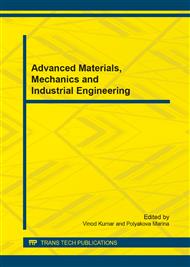p.714
p.718
p.723
p.731
p.736
p.743
p.747
p.753
p.758
An Approach to the Construction of the Personalized Knowledge Map in Knowledge Management Systems
Abstract:
This paper proposes a personalized knowledge map construction method to facilitate knowledge map construction in knowledge management systems. Knowledge map is an important tool in knowledge management systems. Considering the classification habits, the providing of the personalized knowledge map can make the knowledge searching more easily. The tagging reflects the user’s classification habits. Moreover, the words in the tags reflect the user’s word using habits. Therefore, we proposed an approach to the personalized knowledge map construction. Firstly, the documents are pre-processed including eliminating the stop words and stemming the word. Secondly, the KNN algorithm is modified, in which both the vector similarity and the tagging similarity are used to calculate the similarity between the documents. Finally, the topic identification methods of the clusters are proposed. Afterwards, we evaluate the personalized knowledge map construction methods. The results show that the personalized knowledge map gets a good satisfaction.
Info:
Periodical:
Pages:
736-739
DOI:
Citation:
Online since:
July 2014
Authors:
Keywords:
Price:
Сopyright:
© 2014 Trans Tech Publications Ltd. All Rights Reserved
Share:
Citation:


